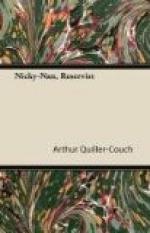When they had settled themselves, Farmer Best opened the meeting.
“Ladies and Gentlemen, Naybours all,” he said,—“I don’t suppose these here proceedin’s will conclude much afore ten o’clock: after which it’ll take me the best part of an hour to get home; an’ what with one thing and another I doubt it’ll be far short o’ midnight afore my missus gets me to bed. Whereby, knowin’ my habits, you’ll see that I reckon this to be summat more than an ord’nary occasion: the reason bein’, as you know, that pretty well the hull of Europe’s in a state o’ War: which, when such a thing happens, it behoves us. I’ll say no more than that, as Britons, it behoves us. It was once said by a competent observer that Britons never, never—if Miss Rounsell will oblige?”
This was a rehearsed effect. Miss Rounsell, taking her cue, struck the key-board, and as Miss Charity Oliver (in the front row) testified next morning, “the effect was electric.” All sprang to their feet and sang the chorus of Rule, Britannia! till the windows shook.
“Thenk ’ee, friends,” continued Farmer Best, as the tumult and the singers subsided. “There’s no more to say but that most of ’ee’s heard tell, in one way or another at some time of his life, of Armygeddon. Well, this here’s of it; an’ if you ask my opinion o’ that fellow they call the Kaiser, I say I wouldn’ sleep in his bed for a million o’ money. And with these few remarks I will no longer stand between ’ee and Mr Boult, who is a speaker all the way from London, an’ will no doubt give us a Treat an’ persuade many of our young friends in front to join up.”
Mr Boult arose amid violent applause. He pulled the lappels of his frock-coat together. He spoke, and from the first moment it was clear that he held at command all the tricks of the hired orator. He opened with an anecdote from the life of President Garfield, and a sentimental application that made the Vicar wince. He went on to point out, not unimpressively, that Armageddon ("as you, sir, have so aptly and so strikingly termed it”) had actually broken upon the world. Farmer Best, flattered by this acknowledgment of copyright in the word, smiled paternally.
“It has burst like a thunderstorm upon the fields of Belgium; but the deluge it discharges is a deluge of blood intermingled with human tears. And where, my friends, is Belgium? How far distant lie these trodden and wasted fields, these smoking villages, these harvests where men’s bodies crush the corn and their blood pollutes the food they planted to sustain it? Listen: those fields lie nearer London than does your little village: men are dying—yes, and women and little children are being massacred—far nearer London than you are peacefully sitting at this moment.”




